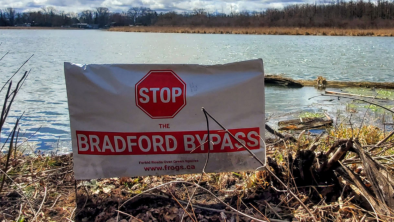Ontario acted ‘unreasonably and unlawfully’ with changes to minister’s zoning order legislation
Wilderness Committee

Toronto, Ont./ Traditional territories of several First Nations including the Williams Treaties First Nations, Huron-Wendat, the Anishnaabeg, Haudenosaunee, Chippewas, and the Mississaugas of the Credit First Nation – Ontario’s Minister of Municipal Affairs and Housing Steve Clark acted “unreasonably and unlawfully” by failing to consult the public before rushing through changes to the rules governing minister’s zoning orders (MZOs), Ontario’s Divisional Court has ruled in a lawsuit brought by Ecojustice on behalf of Greenpeace Canada and Wilderness Committee.
In July 2020, the Ontario government passed omnibus Bill 197, the COVID-19 Economic Recovery Act, without public consultation. This legislation significantly enhances the minister’s powers to unilaterally issue MZOs, among other things.
This is the second time that the Divisional Court has found the Ontario government’s failure to consult with Ontarians before overhauling environmental legislation was unlawful, but the first time the Court has granted a remedy in the form of a declaration. In a prior decision, a majority of the Ontario Divisional Court had determined that the provincial government acted unlawfully when it failed to consult the public before cancelling the province’s carbon cap-and-trade program, but stopped short of granting a remedy.
Four months after Bill 197 became law, the government finally posted the legislative amendments to the Environmental Registry of Ontario (ERO) for public comment. In its decision, the Court asserted that “an after-the-fact posting does not satisfy the requirements of the Environmental Bill of Rights (EBR), which is meant to give the public an opportunity to be consulted on certain types of proposals that could have a significant effect on the environment before such a proposal is enacted.”
The lawsuit also challenged the government’s failure to consult before making changes to other legislation, including the Environmental Assessment Act. As part of Bill 197, the government changed the law to retroactively exempt itself from having to consult about the changes to the Environmental Assessment Act. The Court found that there was no prohibition against retroactive legislation and ruled that the government acted lawfully when making these changes.
Ian Miron, Ecojustice lawyer, issued the following statement in response to the Divisional Court’s ruling:
“We are pleased that the court has held the Minister of Municipal Affairs and Housing accountable for failing to consult the public before expanding his powers to issue zoning orders to fast-track development. However, this decision also makes clear Ontarians will have to closely guard against future attempts to write their participation rights out of the law
“Bill 197 is not the first time that the government has jeopardized the environment by unlawfully cutting the public out of decision-making. Although we’re disappointed that the Court dismissed other parts of the case, we hope that the accountability provided by its declaration will encourage the government to end this behaviour.”
Ali Naraghi, Legal counsel for Greenpeace Canada, said:
“Doug Ford’s government has an established pattern of shutting down public participation so it can greenlight environmental destruction for a quick profit. But this decision by the Ontario Divisional Court is yet another reminder to the Ford government that it is not above the law. Ontarians have a legal right to participate in decisions that impact the environment – and the government must respect that.”
Katie Krelove, Ontario campaigner for the Wilderness Committee, said:
“People in Ontario want to have a voice when it comes to decisions that affect the land, water, air and biodiversity our health depends on. Facing a climate crisis, massive biodiversity loss, unchecked urban sprawl and the ongoing pandemic, this is more important than ever. We hope the court’s decision will ensure public environmental rights to participate are taken seriously by the Ontario government in the future, but we will continue to keep watch and hold their feet to the fire.
Background
Once used sparingly, the Ontario government has recently ramped up its use of MZOs, issuing more than 40 MZOs since 2018. Many of these have served to greenlight controversial development projects with known environmental implications. There has been significant public opposition to these local environmental impacts and the government’s overuse of MZOs.
Legislative changes to MZOs formed part of the omnibus Bill 197, named the COVID-19 Economic Recovery Act, which was tabled in July 2020 and passed without any public consultation in the space of just two weeks. Bill 197 also included major changes to other pieces of environmentally -significant legislation, including the Environmental Assessment Act. The Ontario Divisional Court did not find the Ontario government acted illegally before making these other changes within Bill 197.
Excerpts from the court ruling:
“It is noteworthy that the Auditor General had informed the Ministry on July 17, 2020, before the Schedule 17 amendments were adopted, that Schedule 17 should be posted on the ERO [Environmental Registry of Ontario] because of its environmental significance. However, the Minister failed to do so.” (par. 68)
“The Minister’s decision not to post the amendment respecting MZOs was unreasonable for two reasons: first, the scope of the expanded powers respecting zoning and site planning control, and second, the Minister’s decision to post the provisions and invite comment, including about repeal, after their enactment. These are amendments that manifestly could have a significant impact on the environment, and there is nothing in the record to support the reasonableness of the decision not to post.” (par. 69)
“[T]he Minister did not post the s. 47 amendments in accordance with the EBR despite a recommendation from the Auditor General that he do so. I agree with the applicants’ submission that an after-the-fact posting does not satisfy the requirements of the EBR, which is meant to give the public an opportunity to be consulted on certain types of proposals that could have a significant effect on the environment before such a proposal is enacted. The Minister of Municipal Affairs acted unreasonably and unlawfully in failing to post the MZO proposal in accordance with s. 15, and this should be recognized by a declaration to that effect.” (par. 99)
For media inquiries section
Katie Krelove, Ontario campaigner | Wilderness Committee
647-208-4026, katie@wildernesscommittee.org
Zoryana Cherwick, communications specialist | Ecojustice
1-800-926-7744 ext. 277, zcherwick@ecojustice.ca
Marie-Christine Fiset, Head of Media, Greenpeace Canada
+1 514 972-6316, marie-christine.fiset@greenpeace.org


